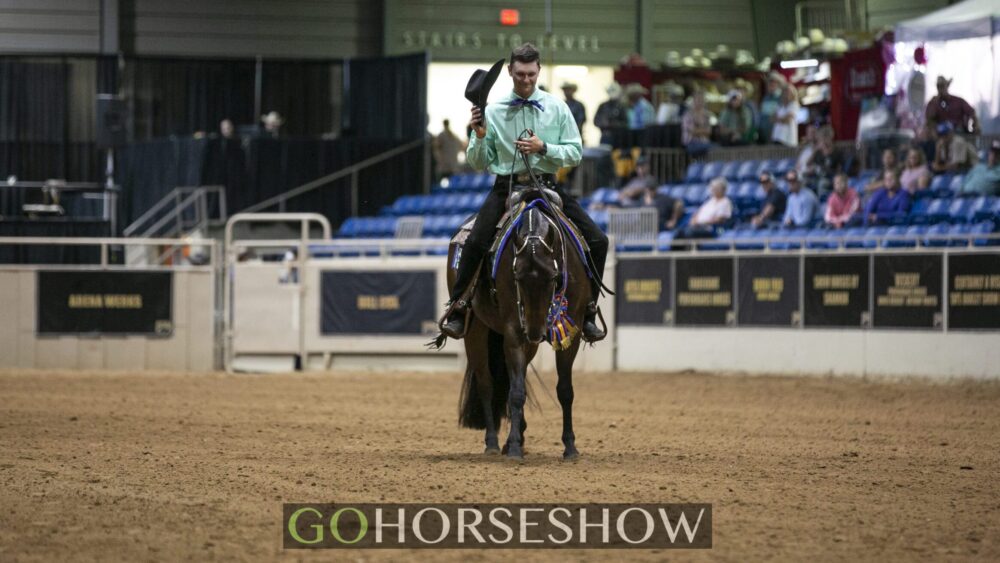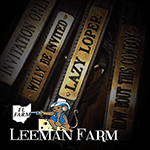Riders are often told that their own mindset affects the horse – if you’re scared, that will telegraph to your hose. If you’re unsure, your horse will sense that. And if you’re confident, your horse will build on that.
But, as we are also aware, horsemanship is about a partnership and horses have a mind of their own. Sometimes the horse operates from a place of fear, worry, or low confidence in their job and what you are asking them to do, which, in turn, impacts the rider.
We spoke with Houston Huff of Houston Huff Performance Horses to get his tips on helping a horse build confidence.
Do Your Homework
Before working with a horse with confidence issues, it is important to understand the source of their issues.
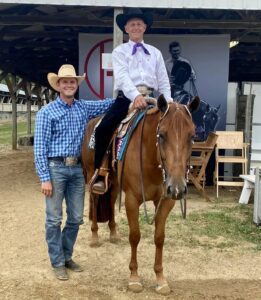 Horses can lack confidence for a number of reasons, including, but not limited to: their age, improper training, abuse, or trauma. While lack of confidence due to a horse being young or lacking training can be workable for experienced amateurs, horses that lack confidence due to abuse or trauma could likely require professional intervention.
Horses can lack confidence for a number of reasons, including, but not limited to: their age, improper training, abuse, or trauma. While lack of confidence due to a horse being young or lacking training can be workable for experienced amateurs, horses that lack confidence due to abuse or trauma could likely require professional intervention.
Huff reminds us, “While sometimes the issue is just with the animal’s temperament, more often than not, the lack of confidence is a result of something that is beyond the animal’s control. Therefore, to deal with it properly, it is important to take a step back and evaluate the horse before getting into things too deeply.”
“If you know why the horse is acting the way it is, you are in a better place to develop a tailored plan for resolving it,” Houston explains.
Build Patience
Huff believes that, in order to help a horse build confidence, you need to get them in a mental place to accept your training.
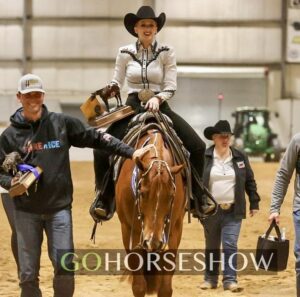 “I truly believe the best way to help a horse build confidence is to teach them to be patient. A horse that lacks confidence often has a busy mind and they’re focused on everything but their handler. However, if you can teach a horse to be patient and quiet their mind, you will be in a much better position to proceed with training exercises.”
“I truly believe the best way to help a horse build confidence is to teach them to be patient. A horse that lacks confidence often has a busy mind and they’re focused on everything but their handler. However, if you can teach a horse to be patient and quiet their mind, you will be in a much better position to proceed with training exercises.”
He has found that the best way to teach a horse patience is to make them stand tied. “Teaching a horse to tie has so many benefits. I like to tie all of my horses, whether young or broke, so that they learn to stand quietly and stay that way.”
Huff will have his horses tie in their stalls before feeding time, or on the wall while he’s working other horses to teach them to be patient and submissive to control. Once your horse learns to stand quietly and respect the tie, they are in a position to proceed with other work to build their confidence.
Houston emphasizes that the keys to successful tie training are (1) safety – tie them in a safe place with a safe knot and halter and (2) timing – do not untie them until they have stood quietly, but also don’t leave them tied forever.
Build the Foundation
Huff emphasizes ground work and riding warm ups to building a horse’s confidence…in that order.
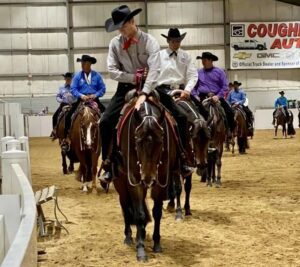 If a horse lacks confidence, it is important to go back to the basics and make sure the foundation is strong. To build a proper foundation, one needs to start from the ground up – literally.
If a horse lacks confidence, it is important to go back to the basics and make sure the foundation is strong. To build a proper foundation, one needs to start from the ground up – literally.
“I treat horses that lack confidence like a young horse that I’m starting, regardless of how broke they are,” Houston admits.
“I will start with emphasizing their ground work to make sure that they respond to pressure on the lead and allow me to control their feet from the ground,” he explains.
“This involves moving their feet with pressure on the lead, moving toward you when asked, and staying out of your personal space bubble. It also involves stopping foot movement when asked. I don’t use verbal commands with my horses often, but I do use ‘whoa’ and when I say it, I mean it. If you can’t control their feet from the ground, you won’t have better luck in the saddle.”
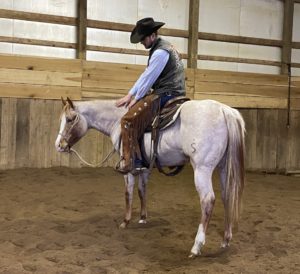
Once the horse is confident and responsive on the ground, Houston will move to the saddle. He will start young horses in a hackamore and focus on them moving forward and away from pressure. His goal is to get his young horses to go around softly and quietly without asking them for a particular headset or speed.
For the flighty, reactive horse, Huff goes back to those basics and treats them like a young horse. If you can’t get an older horse to relax, he recommends you let them move out more and have a little more pace with lots of direction changes and free movement. “Make them work hard, so that slowing down on a long rein is a reward and a break from hard, physical work.”
Time Your Release Right

Training an animal is all about asking for a particular behavior and then rewarding that behavior when they give it to you. In the performance horse world, the biggest reward is the “release.”
“You have to make sure that you time your release of pressure, whether from your hands or legs, with the desired behavior. You want to communicate clearly to your horse that they have done what you asked and you’re happy with them,” Huff explains.
Houston says he will pet his horses and tell them they did good after releasing the pressure in order to reinforce the connection with them and build their confidence in their performance.
Set Them Up For Success
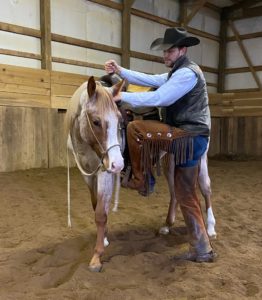
One of the most important lessons in working with horses is learning to manage one’s expectations. Huff believes the expectations we set for ourselves and our animals can have a huge impact on their confidence.
He emphasizes, “You need to put them in positions to always win. Don’t ask them for something that is beyond their capability to give. They learn by doing something correctly and the release from that. So, if you put them in a position to fail, you know you are just going to frustrate them and yourself. And a frustrated horse will quickly lose confidence in you as a rider and in their ability to please you.”
If you can set your horse up for success and rewards, they will only gain confidence in you and your partnership with them.


